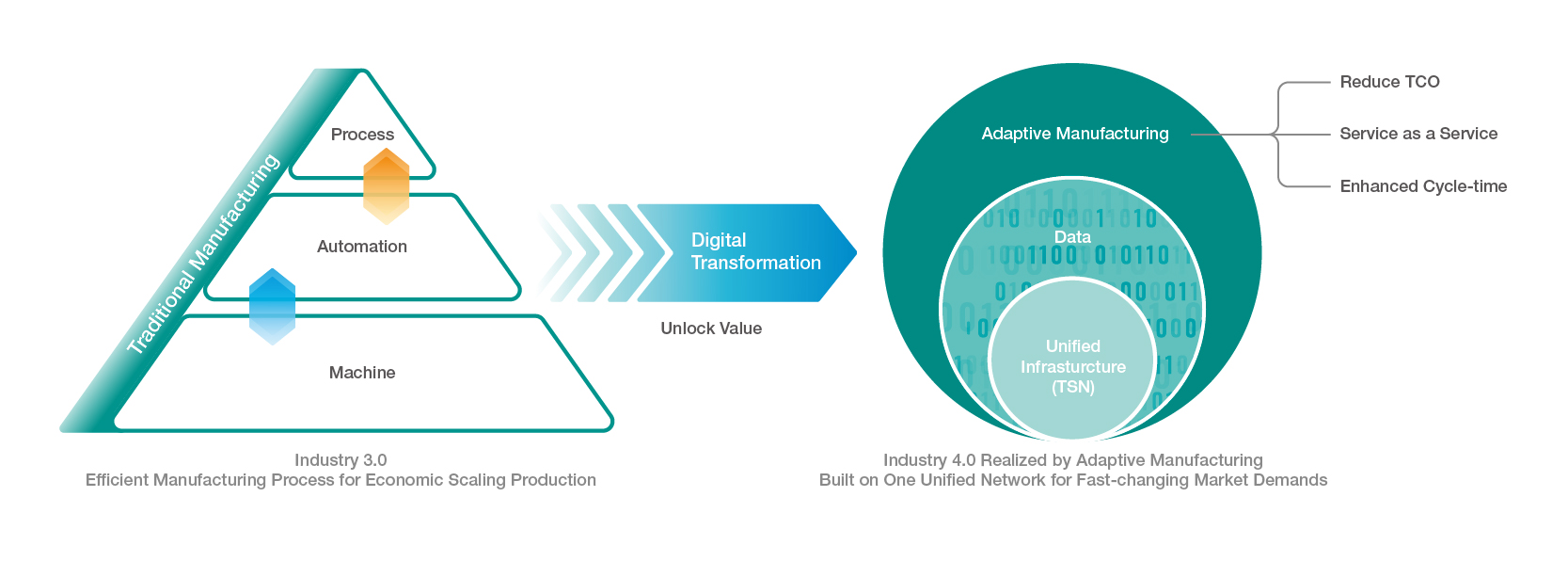Most companies take advantage of economies of scale by producing a larger number of goods to gain proportionate saving in costs. However, it is not always the case that the more goods that are produced, the less each unit costs. Nowadays, most companies have reached the optimum point of economies of scale and that the cost for additional units is increasing. As mass production is no longer the only answer, we find ourselves asking, what’s next? The combination of markets continuing to change rapidly and global supply chain challenges have forced companies to find new ways to adapt to these challenges to become more competitive. How to implement Industry 4.0 and Industrial Internet of Things (IIoT) applications and transform smart factories using digital transformation becomes key to the survival of companies amid the current turbulent climate.
Adaptive Manufacturing Brings Success Now and in the Future
To become agile and responsive to market demands, it is important to consider adaptive manufacturing. The concept of adaptive manufacturing lies in a company’s ability to rapidly adjust production operations to meet the new, customized demands—an increasingly important capability for companies to stay competitive, and to cope with supply chain disruptions caused by COVID-19. Adaptive manufacturing, which includes close co-competition within ecosystems and strategies for mass customization, is the foundation for Industry 4.0 and IIoT, as it uses a production system that focuses on data to ensure everything is connected, communicated, and that the right decisions can be made quickly. The table below illustrates the concept of adaptive manufacturing.
- Concept of Adaptive Manufacturing
| Production Aspect |
Benefits and Results |
| Asset Management |
Greater control over assets to ensure continuous operations and lower the TCO. |
| Service-as-a-service |
Enhance connectivity to provide more efficient and innovative services. |
| Integration of Control Systems |
Integrate control processes and automation systems on the production line to enhance production efficiency and operational excellence. |
Time-sensitive Networking Bridges the Gap Between Traditional and Adaptive Manufacturing and Amplifies the Benefits
It is never easy to choose the right approach to retrofit existing facilities, especially when it involves enlarging the facilities. Time-sensitive networking is a game changer for digital transformation in the automation industry and is the foundation of unified infrastructure. TSN offers time synchronization, low-latency communications, ultra-reliability, and better resource management. This facilitates the merging of IT and OT networks to connect all end devices and centralize data collection on a standard Ethernet network. Digital transformation can be achieved by real-time information made possible by TSN, enabling factories to optimize their production strategies to fast-changing markets and emerging challenges.

The potential of adaptive manufacturing is huge. First, if we consider asset management, it saves costs from the very beginning when a unified infrastructure is built. TSN can connect multiple applications and diversified systems on one unified network, which makes it easier to operate and maintain as less equipment and cables are needed at the field level. Meanwhile, one unified network converges both IT and OT networks, which means modern IT technologies, such as artificial intelligence and machine learning, can be incorporated to assist operation efficiency and give owners more control over their assets. Second, companies can evolve from selling products to selling services, offering more customization and reducing the minimum order quantity (MOQ) without losing profitability and giving owners more possibilities. Third, integrating control systems substantially reduces the cycle time. A few years ago, it might have required weeks to shift the entire production process to producing a new product, but by integrating different control systems, it will only take a few days, making adaptive production not only feasible but also profitable.
Three Real-world Cases That Tap Into the Benefits of One Unified Network
Moxa has helped customers around the world tap into the benefits of adaptive manufacturing. Read on to understand how TSN helps accelerate digital transformation for industrial automation.
- One Unified Network to Realize Adaptive Manufacturing
A product manufacturer planned to connect their various systems—including production, assembly lines, and logistics systems—on one unified network to realize shorter production cycle times and lower the total cost of ownership. From a production viewpoint, TSN accomplishes integration of control with reduced cycle times, reduces the total cost of ownership through a simplified topology with fewer assets to manage, and realizes service-as-a-service through one unified network.
- Enabling Multiple Applications on a Unified TSN Network to Reduce the Production Cycle Time
A global leading manufacturer of industrial machinery is leveraging TSN technology to aggregate multiple applications in CNC machinery. To achieve its scalable, accelerated sensing, and advanced machine control systems, the deterministic laser and motion control need to work harmoniously together. With TSN, the devices can be efficiently integrated, and the production cycle time can be successfully reduced.
- AI-driven Operational Efficiency for a Hydropower Plant to Reduce the TCO
The operating company of a hydropower plant was determined to bring all their isolated networks together and implement an AI system for their control network by embracing the TSN standard, which was a perfect fit for this kind of use case, as performing services on a converged network was much easier than on disparate networks. The hydropower plant improved efficiency and the ability to quickly adjust the total power output to the grid as needed, giving rise to a new hydropower plant with lower costs, easier maintenance, higher efficiency, and improved adaptability.
If you want to learn more about our solutions, you can download our case studies.
TSN is an advanced technology that helps industry leaders accelerate their digital transformation in industrial automation. In this article, we briefly introduced adaptive manufacturing and the core technology, TSN, that helps achieve it. Building on this point, the three real-world cases demonstrated how companies can revolutionize their industrial operations while tapping into the benefits of TSN.
For more information about our TSN technologies, please visit our microsite: www.moxa.com/TSN